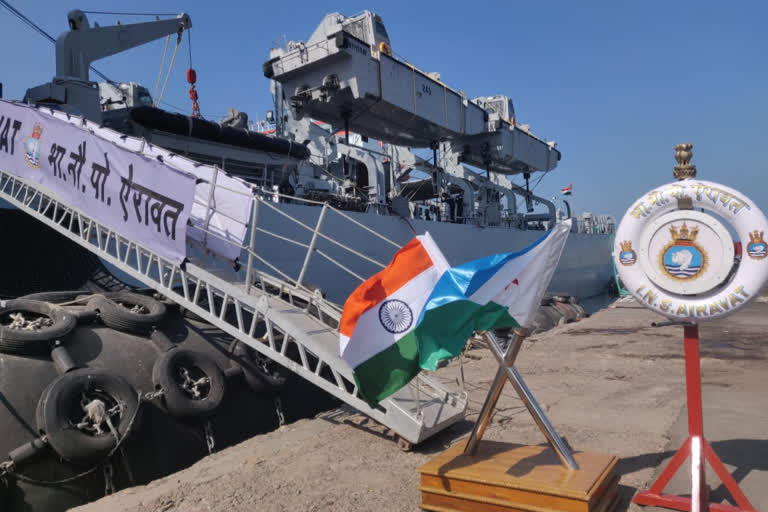New Delhi: With the Indian Ocean and its neighbourhood increasingly becoming a playground for global naval powers to build, consolidate and extend their respective areas of influence, the East African nation of Djibouti is an area of focal interest to the global powers including India and China.
On Wednesday, 50 tons of food—wheat, rice and sugar—ferried by the Indian Navy’s INS Airavat, was donated to the Djibouti authorities as part of the ongoing SAGAR (Security and Growth for All in the Region) plan—an effort of assistance to friendly foreign countries to overcome natural calamities and the COVID-19 pandemic.
The increased focus on Djibouti is guided by India’s geopolitical and military interests.
With about 10 lakh population, Djibouti may be a tiny country but situated on the Bab el-Mandeb Strait right on the ‘gateway’ to the Suez Canal, it sits pretty at a vantage location to keep an eye on the world’s busiest shipping lane.
That is why it is home to major military bases and naval stations belonging to US, France, Japan, Saudi Arabia and China while several other nations including the Germans and the Italians maintain some presence in the garb of fighting piracy.
India has in place key mutual logistical service pacts with the US, France and Japan that allows access to each other’s military facilities, logistical support, supplies and services all across the globe which includes refuelling, spares, fitments etc for military assets and platforms.
Read: Facing off China, east Ladakh is ‘picnic’ for many Indian soldiers
The India-US Logistics Exchange Memorandum of Agreement (LEMOA) was inked in 2016, a logistics support pact was signed between India and France in 2018, while the Acquisition and Cross-Servicing Agreement (ACSA) was signed with the Japanese in 2020.
In effect, Indian influence in Djibouti will allow it to freely operationalise its existing pacts with the US, France and Japan thereby greatly enabling Indian Navy’s reach. This will enable it to counter the Chinese who aim to establish itself as the paramount naval power in the Indian Ocean region.
Strategically, robust Indian influence in Djibouti would allow India to circumvent the ‘String of Pearls’ theory that stands for the Chinese network of military and commercial bases along its sea lines of communication that would also ‘encircle’ India.
While the US base at Camp Lemonnier, set up in 2001, houses more than 4,000 troops, it is the biggest American base in Africa. The Japanese base in Djibouti was set up in 2011.
On the other hand, the Chinese base at Doraleh port, started in 2017, is witnessing development at breakneck speed besides bigger Chinese troop presence.
Read: PM Modi, President Jinping to 'sit together' 5 times in next 20 days
Interestingly the distance between the US and the Chinese base is a mere 7 km.
Chinese influence in Djibouti is also spreading at a fast pace mainly due to China’s ‘debt-trap diplomacy’ which has accumulated a debt of around 1.2 billion USD. The Asian giant’s huge loans to developing countries have accumulated more so due to the economic impact of the ongoing COVID 19 pandemic.
According to the IMF, Djibouti’s public external debt has risen from 50 per cent of the GDP in 2016 to 104 per cent by 2018-end, “much of it based on Chinese lending.”
On the piling debt, the US Congressional Research Service (CRS) says: “The debt has raised concerns among US officials that the country may be increasingly vulnerable to Chinese influence or manipulation. Some Djiboutians have also expressed alarm about the lack of transparency around Chinese loans.”
Besides the age-old relationship between traders, India and Djibouti have shared traditional ties.
Djibouti, a focal centre for Indian rescue operations to evacuate its stranded citizens from Yemen, it is now hosting the Indian embassy to Yemen which has been closed since 2015 due to the dangerous political and security situation in Yemen.
No wonder that the East African nation figured as the first port of call for newly-appointed President Ramnath Kovind in 2017. Interestingly, in 2019, Djibouti President Ismail Omar Guelleh was conferred the Padma Vibhushan, India’s second-highest civilian award.
Read: ‘Rafale or Sukhoi, Mi-17 or Apache, integration no issue for IAF’



